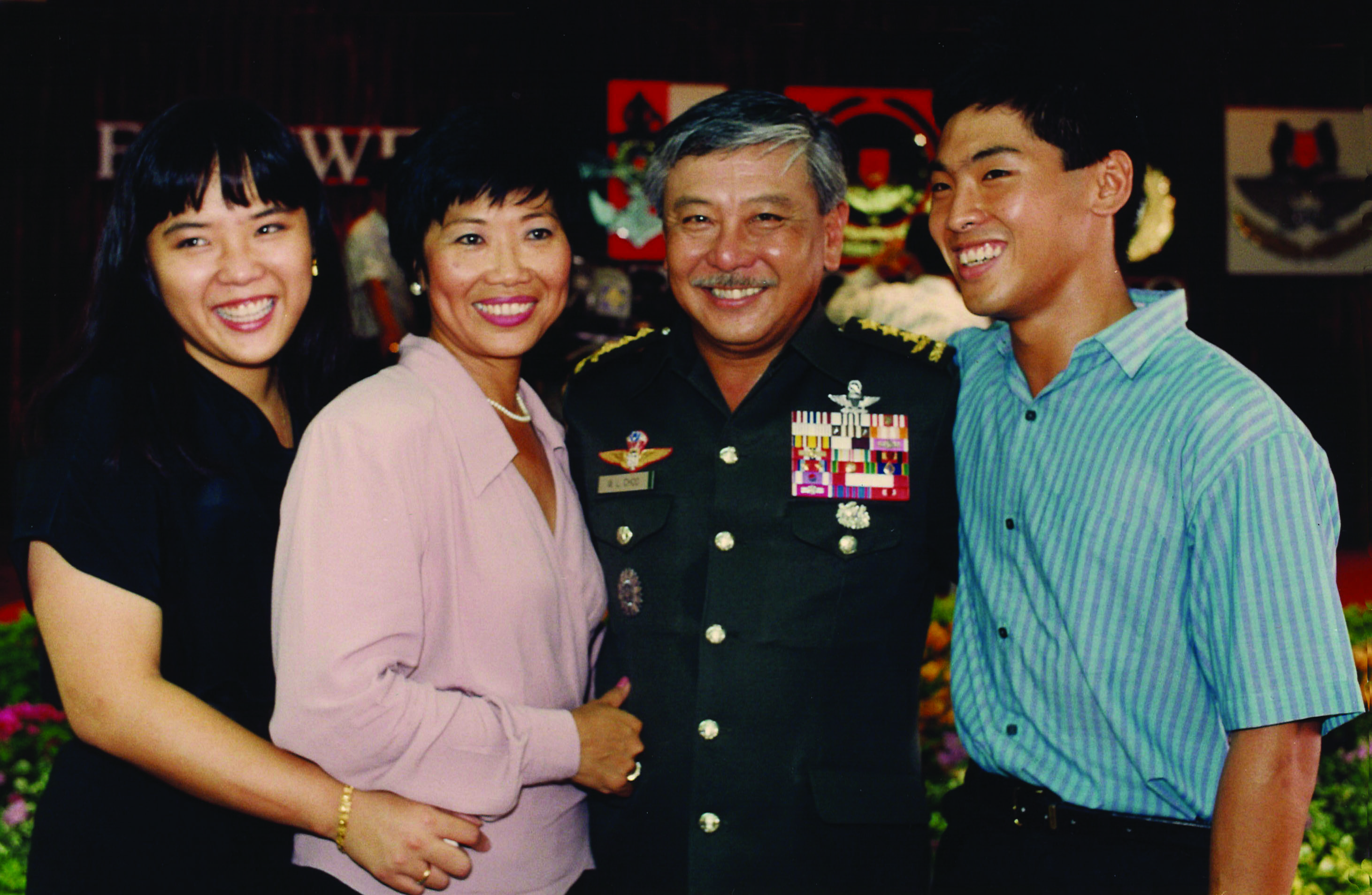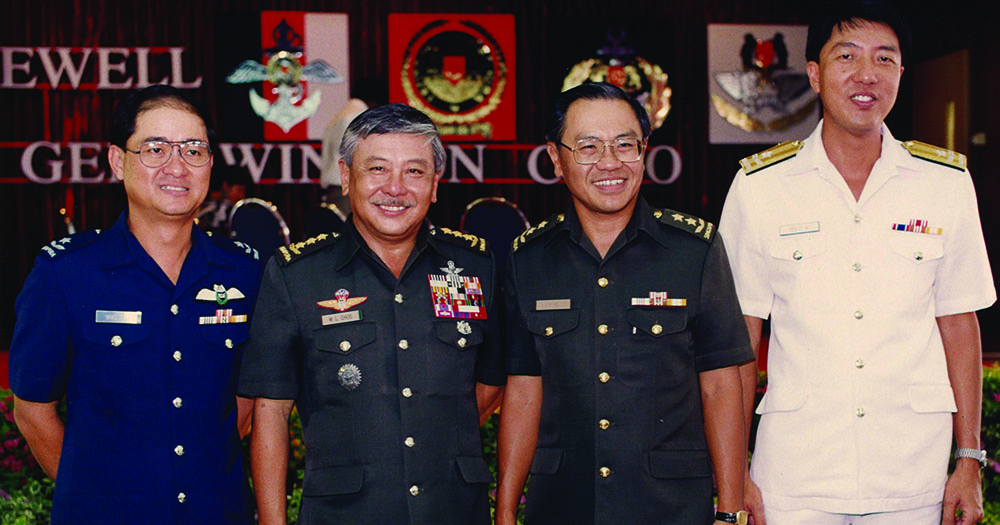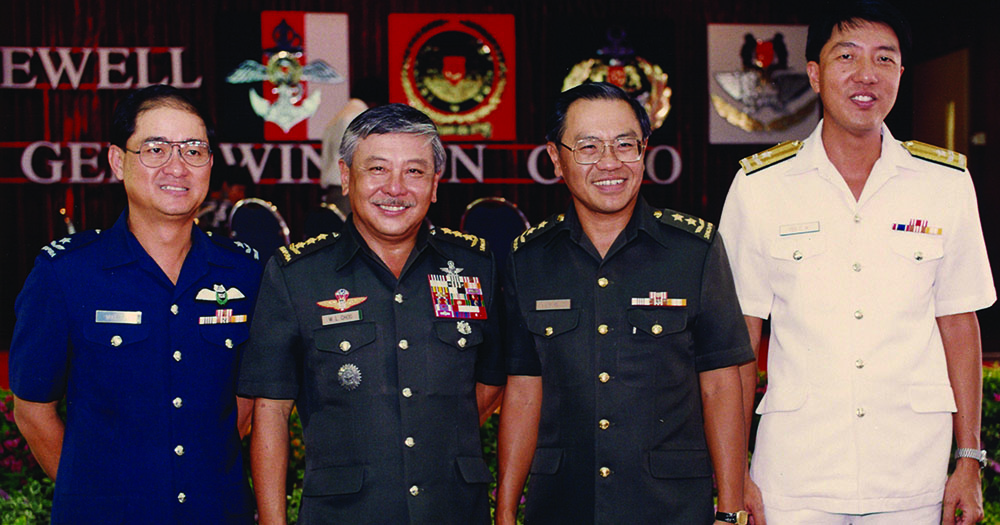PERSPECTIVE: In 1992, Singapore's first three-star General and Chief of Defence Force, Winston Choo, stepped down from his position after a military career spanning 33 years.
Choo had led the Singapore Armed Forces from 1974, first as Director of General Staff, then as Chief of General Staff, and finally as Chief of Defence Force in 1990.
He also became Singapore's first three-star general in 1988, when he was promoted to the rank of lieutenant-general.
Here, we reproduce excerpts from his memoir Winston Choo: A Soldier at Heart, in which he shares about his first post-SAF job after stepping down, as Chairman of Chartered Industries of Singapore (CIS), and the changes in mindset that came with a civilian job.
Written by Chua Siew San and Judith D'Silva and published by Landmark Books, you can get a copy of Choo's memoir here.
By Winston Choo
Stepping down as Chief of Defence Force
I was mentally prepared to step down as CDF. When the time came, I had no qualms about leaving the SAF. I also told myself that I was only separating from the SAF; this was not retirement. I was 50 years old and retirement at the age of 50 did not seem right to me.
As I listened to the experiences of my counterparts in other countries who had retired, I knew I was going to be fine. They told me, for instance, that they did not even know how to buy postage stamps or how to pay their utility bills as most of these things had been done for them. They were warning me that since I had been CDF for so long, I would be even worse off than them.
Fortunately, I had never led a sheltered life. When I was CDF, I ate at hawker centres, did things for myself without expecting others to take care of things for me. I was a regular Singaporean guy.
Once I queued for popiah (fresh spring rolls) at a hawker centre and the stall-holder did not believe his eyes. He looked at me and said, “Hey, you look like Winston Choo!” I said, “Yes, I am.” “Really, you are Winston Choo?” “Yes, I am Winston Choo,” I repeated.
The customer in front of me turned round, looked at me and laughed. I asked the popiah seller why he did not believe me and he said, “No lah, Winston Choo won’t come here and buy popiah. People will come to buy popiah for him.”
When it came to my turn, I said, “I don’t want to take out my IC to show you that I am Winston Choo. I have no brothers who look like me.”
When Kate, who had gone to buy something else, joined me at the popiah stall, she laughed and told the stall-holder, “This is my husband, and I am Mrs Winston Choo.” This little encounter confirmed in my mind that people have expectations of you which may be very wrong.
 Winston Choo with his family at his farewell parade on June 30, 1992. Photo courtesy of Landmark Books.
Winston Choo with his family at his farewell parade on June 30, 1992. Photo courtesy of Landmark Books.
 With service chiefs at Winston Choo's farewell parade. From left to right, Brigadier-general Michael teo, Lieutenant-general Winston Choo, Major-general Ng Jui Ping and Rear-Admiral Teo Chee Hean. Photo courtesy of Landmark Books.
With service chiefs at Winston Choo's farewell parade. From left to right, Brigadier-general Michael teo, Lieutenant-general Winston Choo, Major-general Ng Jui Ping and Rear-Admiral Teo Chee Hean. Photo courtesy of Landmark Books.
A job outside the government
What would I do after I left the SAF? I discussed it with my wife. I was thinking of getting a job outside the government. How much I was paid was not the issue. I just needed to do something. There were a couple of offers, but I was not in a hurry to accept.
I told myself not to jump into anything, but to take my time and find my way around. Just days before I left the SAF, PM Goh Chok Tong had invited me to the Istana for lunch. He asked if I would like to head a statutory board. It was not something I saw myself doing, so I said no.
I said to him, “It’s been 33 years, maybe I should take a break.” But though I would have appreciated a clean break, I sensed at that time that to make a complete break from the establishment would be a wrong signal.
So I took the offer to become Chairman of Chartered Industries of Singapore (CIS). I thought it was good for the Government to be seen to be looking after me. In any case, CIS was something familiar to me because the SAF was at that point its biggest customer.
My move to CIS was one that had no precedent. How would they remunerate me? With Mindef’s penchant for equity and such, they worked out my salary in a way that I neither gained nor lost.
CIS paid me the difference between my monthly pension and my last drawn salary, so that in effect I received what I was paid as CDF. It was clever but I did not think it was very fair. Some people thought I was short changed.
My pension was something I earned for my past service and should not have been a factor. If I was given a new job, I should be paid the worth of that job. Still, I did not quibble. My approach to life has always been to be content with what God gives me. And I was happy that CIS provided me a car and a driver.
From the mindset of a customer to that of a vendor
I was with CIS from July 1992 to February 1994.
The biggest mindset shift for me going to CIS was that I was now the vendor whereas I used to be the customer. I was now on the other side of the relationship. I once used to call CIS to come and see me. Now I had to go to my customer. It was a learning process for me.
Although I had prepared myself mentally for the change, there were some finer aspects that I had to learn. I had to remember that I was no more the Chief commanding more than 250,000 regulars and reservists.
I now had 3,000 people working under me, mostly civilians though some were, like me, formerly from the SAF. I also had to remind myself that I should not be giving orders but making requests. For instance, I used to tell my Personal Assistant, “Send for So-and-so.” Now I had to say, “Can you find out whether So-and-so is free to see me.”
Being on the other side, I had to hold meetings with people who used to be my subordinates.
Once I chaired a meeting with RSAF officers to discuss some issues about ammunition. The Head of the Ammunition Division in CIS was a very heavy smoker. The ban on smoking in government buildings was already in force and an aggrieved RSAF lieutenant-colonel asked, “Why are we smoking here?”
I kept quiet, and he turned to me and repeated his question, “Why are we smoking here, Mr Chairman?” I told him, “This is a commercial establishment. This is the CIS building, not the Ministry of Defence. We have always smoked here. But if it bothers you, we won’t do it.”
“But do you know who your owner is?” he retorted, “The Government owns this place.” What audacity! So I said, “Yes, but this is still a commercial establishment. If it distresses you though, I will tell them to stop smoking.”
The word got back to the bosses in the RSAF. A senior officer rang me to apologise. But I was not upset because I realised that it was something that came with the switching of roles. The difference between customer and vendor was very stark.
I found arguments that I used to make as a customer being thrown back at me
There was also the reversal of viewpoints. The SAF was CIS’s only significant customer. We were producing small arms ammunition but we were not using the whole capacity of the lines because the demand from the SAF alone, without overseas sales, was not enough.
It was expensive to maintain the production line, but it was Mindef’s requirement that we maintained it as a strategic capability. So I tried to negotiate with Mindef to pay for the maintenance of the production line and I found myself being thrown the same arguments I used to make when I was CDF.
I did not succeed and had to make the very painful and unpopular decision to downsize the ammunition division. I cannot remember exactly how many people were retrenched but it was a sizeable number. I tried to soften the blow by getting some of them transferred to the other CIS companies, and giving early retirement to others.
But I could not help everyone, so it was quite a blow. It was not the first thing I wished to do in my new role, but it had to be done to keep the business viable.
Notwithstanding the adjustments I had to make, CIS was a very useful transition to the private sector for me. It was a civilian organisation but dealing with military things and many people there were ex-military personnel. It was a nice half-way house.
A good learning experience in the commercial world
CIS made ammunition, artillery weapons, armoured vehicles, anti-aircraft guns. There was a logistics arm and an international marketing outfit. Even the mint was part of CIS, to my surprise. I used my military knowledge to translate into handling what were called sub-units; now they are called subsidiaries.
CIS had to try hard to sell our products overseas. But it was difficult to compete with the Chinese and South Koreans on small arms ammunition because they were heavily subsidised by their governments while we were not. We could not match their prices.
There were also weapons we were producing under licence from others, such as the AR-15 rifles from Colt, which we could not sell to others. CIS resorted to designing our own assault rifle, the SA88A, a worthy product which we tried to market overseas.
As CDF, I had made the Istana guards carry them as an endorsement of a local product. CIS had designed and started producing the Ultimax light machine gun even before I became its Chairman. It was a very good weapon and was already adopted by the SAF.
But again, it was hard to sell overseas. Our best advertisement came from a Time magazine cover showing Philippine General Fidel “Eddie” Ramos and Secretary of Defense Juan Ponce Enrile with the Ultimax slung over their shoulders during the People Power Revolution in Manila. But I don’t think we have sold many Ultimax guns to this day.
One difficulty with selling arms and military equipment is that countries mostly make their decisions not on the merits of the equipment, but on political grounds or to favour their own manufacturers.
The arms industry is a tough business. I was involved in it for one-and-a-half years and had first-hand experience of this. I cannot say I had a glorious and successful time in CIS. But it was excellent exposure, and a good transition for me to the commercial world.
Follow and listen to our podcast here
Top photo of Winston Choo courtesy of Landmark Books
If you like what you read, follow us on Facebook, Instagram, Twitter and Telegram to get the latest updates.
